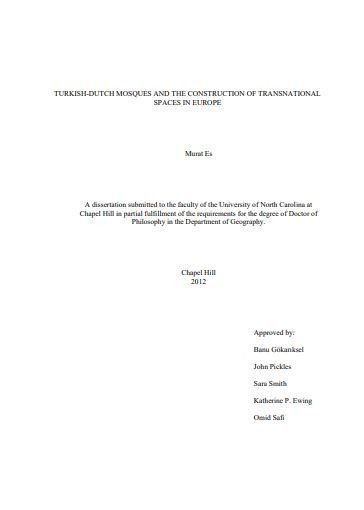
This dissertation examines the production of transnational Turkish-Muslim identities and ethno-religious spaces in the Netherlands by focusing on the contested construction, meanings, and operations of mosques controlled by immigrants and citizens of Turkish background. The Turkish-Dutch form the largest `non-native’ minority group in the Netherlands. Organized under multiple and competing organizations, Turkish Islamic organizations control nearly half of the 500 mosques in the country. As elsewhere in Europe, the long existent `invisible’ mosques -converted from idle schools, factories, and church buildings–are being complemented by recently established mosques that are purpose-built with identifiable architectural features. At the same time, parallel to the rise of increasingly popular discourses on `failed multiculturalism’ across Europe, mosques have become signs of ghettoization, urban decline, and failed integration for many in the Netherlands. Departing from the focus on mosques in relation to radicalism and Muslim claims to public space that characterize most studies on European mosques, this dissertation approaches mosques as dynamic and contested sites that play an important part in the production of ethno-religious subject positions. Building on recent scholarship in cultural geography, I investigate the relationship between the contested construction of mosque spaces and Turkish-Dutch identities through transnational imaginaries and everyday material practices. In ten months of field research, I collected data through participant observation, interviews with mosque administrators, imams, and civil society representatives, and focus group meetings with activists, youth, and women involved with mosques controlled by various organizations. My argument is that mosques play a seminal role in the production of ethno-religious belonging and highly gendered moral citizen-subject positions through not only public rituals but also mundane, quotidian spatial practices. My research findings indicate that the morally safe experiences of socialization provided by mosques are becoming increasingly central to the operations of mosques. Mosques also gain significance as spaces of carefully orchestrated as well as chance encounters and interactions between the Turkish-Dutch, other Muslim groups, and the native-Dutch through interfaith dialogues and Open Days. These events are crucial to the (re-)drawing of boundaries between Turkishness, Dutchness, Islam, Europe, Christianity, and secularity.
Es, M. ‘Turkish-Dutch Mosques and the construction of transnational spaces in Europe’ (unpublished doctoral thesis: University of North Carolina, 2019).
I agree to the terms outlined below:
You agree to upload and assign Mosqpedia Database the rights to use the content worldwide and in perpetuity across all current and future media platforms. Mosqpedia Database may edit, copy, adapt and translate your contribution.
The content will be distributed under the Creative Commons Attribution-Deed – Attribution-NonCommercial-NoDerivatives 4.0 International – Creative Commons
All data will be stored in line with data protection regulations.